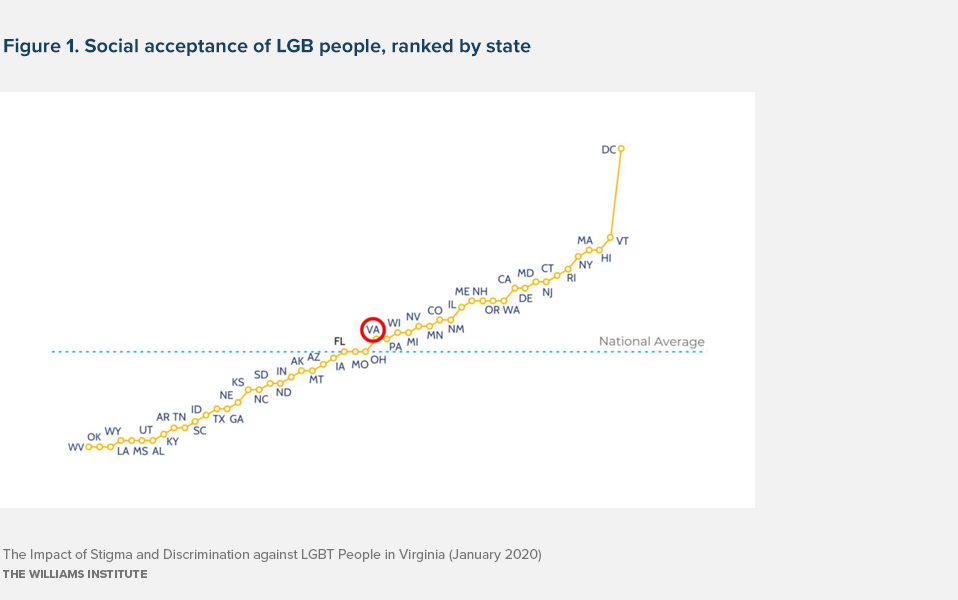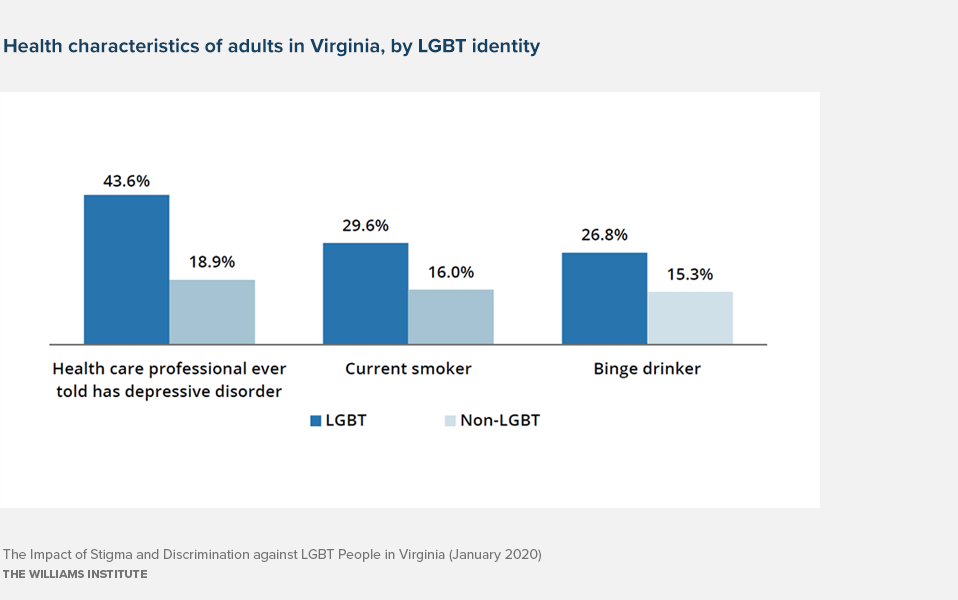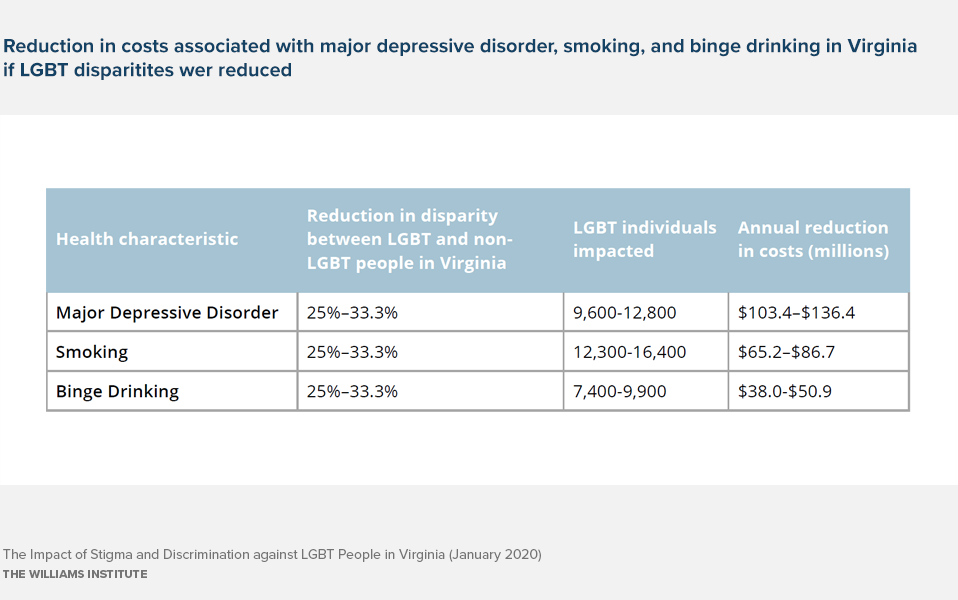Executive Summary
Virginia is home to an estimated 257,000 LGBT adults and 50,400 LGBT youth. LGBT people in Virginia lack important legal protections that have been extended in other states. For example, statewide statutes in Virginia do not explicitly prohibit discrimination based on sexual orientation or gender identity in areas such as employment, housing, and public accommodations. State laws in Virginia also fail to adequately protect LGBT students from bullying and harassment. In terms of social climate, Virginia ranks 24th in the nation on public support for LGBT rights and acceptance of LGBT people.
The legal landscape for LGBT people in Virginia likely contributes to an environment in which LGBT people experience stigma and discrimination. Stigma and discrimination can take many forms, including discrimination and harassment in employment and other settings; bullying and harassment at school and family rejection of LGBT youth; overrepresentation in the criminal justice system; and violence. Research has linked stigma and discrimination against LGBT people to negative effects on individuals, businesses, and the economy.
In this study, we provide data and research documenting the prevalence of several forms of stigma and discrimination against LGBT adults and youth in the U.S. and in Virginia specifically, including discrimination and harassment in employment, housing, and public accommodations; bullying and harassment in schools; and family rejection of LGBT youth. We discuss the implications of such stigma and discrimination on LGBT individuals, in terms of health and economic security; on employers, in terms of employee productivity, recruitment, and retention; and on the economy, in terms of health care costs and reduced productivity.
To the extent that Virginia is able to move toward creating a more supportive environment for LGBT people, it would likely reduce economic instability and health disparities experienced by LGBT individuals, which, in turn, would benefit the state, employers, and the economy.
Key Findings
Prevalence of Stigma and Discrimination against LGBT People
LGBT people in Virginia experience discrimination in employment, housing, and public accommodations.
- In 2019, the Equal Rights Center released a report investigating bias against LGB job applicants in Virginia using matched pairs rights testing. The report found that in two of 10 tests, a heterosexual job applicant was offered the job over an equally-qualified LGB tester. In the remaining 8 tests, both or neither tester were offered a job. In none of the tests was the LGB tester offered a job over the heterosexual tester. Additionally, one LGB-identified tester reported that he was openly ridiculed by two employees when disclosing his sexual orientation.
- The 2015 U.S. Transgender Survey (USTS) found that among transgender respondents from Virginia who held or applied for a job in the prior year, 24% reported being fired, being denied a promotion, or not being hired for a job because of their gender identity or expression. In terms of housing discrimination, 20% of respondents from Virginia reported experiencing some form of housing discrimination in the past year, such as being evicted from their home or denied a home or apartment because of being transgender, and 9% reported that they experienced homelessness in the past year because of being transgender. In addition, of those respondents who visited a place of public accommodation where staff or employees knew or thought they were transgender, 31% experienced at least one type of mistreatment in the past year because of being (or being perceived to be) transgender.
- A 2015 survey conducted at Virginia Tech found that LGBT faculty and staff felt less comfortable reporting acts of discrimination than their heterosexual counterparts (72.9% vs. 83.0%). Additionally, LGBT faculty and staff were more likely to witness discriminatory behavior (29.6% vs. 19.5%) and experience discriminatory behavior (18.8% vs. 12.2%) than heterosexual faculty and staff.
- In 2014, Housing Opportunities Made Equal of Virginia sent emails to housing providers in the Richmond area in matched pairs to assess the existence of sexual orientation discrimination. In each pair, one email was sent to an apartment complex suggesting that it came from a same-sex couple while the other email to that same apartment complex suggested that it came from a different-sex couple. Out of 34 matched-pair tests, 44% resulted in treatment that favored the different‐sex couple.
- In response to a 2016 poll, 58% of Virginia residents, both LGBT and non-LGBT, said that they thought that gay and lesbian people experience a lot of discrimination in the U.S., and 62% of Virginia residents said that they thought that transgender people experience a lot of discrimination in the U.S.
- An analysis of aggregated public opinion data collected from 2011 through 2013 found that 81%of Virginia residents thought that LGBT people experience discrimination in the state.
- Instances of discrimination in employment, housing, and public accommodations in Virginia have also been documented in court cases and media reports.
LGBT youth in Virginia experience bullying and harassment at school.
- The 2017 GLSEN National School Climate survey of LGBTQ middle- and high-school students found that 74% of respondents from Virginia said that in the year prior to the survey, they had experienced verbal harassment at school based on their sexual orientation; 62% said they had experienced verbal harassment at school based on their gender expression. Many students also reported experiencing physical harassment at school based on their sexual orientation (29%) or gender expression (26%) in the year prior to the survey.
- The 2015 USTS found that 80% of survey respondents from Virginia who were perceived to be transgender while in grades K-12 reported experiencing verbal harassment, 27% reported experiencing physical assault, and 15% reported experiencing sexual violence while in school.
- A 2017 Campus Climate survey of students at the University of Virginia found that LGB students were more likely to experience sexual harassment than non-LGB students. Over 60% of non-heterosexual students (61.4%) reported that they had experienced harassment since the beginning of the fall 2016 term. By contrast, only 38.9% of heterosexual students reported having experienced such harassment.
- Instances of bullying and harassment in education in Virginia have also been documented in court cases and media reports.
Impact of Stigma and Discrimination on LGBT Individuals
LGBT people in Virginia experience economic instability.
- Stigma and discrimination against LGBT workers can lead to economic instability, including lower wages and higher rates of poverty.
- Gallup polling data from 2015-2017 show that 27% of LGBT adults in Virginia reported that they did not have enough money for food, compared to 13% of non-LGBT adults in the state. And, 21%of LGBT adults in Virginia reported having a household income below $24,000, compared to 16%of non-LGBT adults. In addition, 9% of LGBT adults in Virginia reported being unemployed, compared to 5% of non-LGBT adults.
- The 2015 USTS found that 6% of transgender respondents in Virginia were unemployed, and 23%were living in poverty.
LGBT adults and youth in Virginia experience health disparities.
- Research indicates that stigma and discrimination contribute to adverse health outcomes for LGBT adults such as major depressive disorder, binge drinking, substance use, and suicidality. Similarly, bullying and family rejection, as well as social stigma more broadly, have been linked to increased likelihoods of dropping out of school, suicide, and substance use among LGBT youth.
- LGBT adult respondents to the 2017 Virginia Behavioral Risk Factor Surveillance System survey were significantly more likely to have been diagnosed with a depressive disorder by a health care professional than non-LGBT respondents (43.6% vs. 18.9%). In addition, LGBT adults in Virginia were significantly more likely to report current smoking (29.6% vs. 16.0%) and binge drinking (26.8% vs. 15.3%) than non-LGBT adults.
Economic Impacts of Stigma and Discrimination
Discrimination against LGBT people in employment and other settings has economic consequences for employers and the state government.
- Productivity. Unsupportive work environments can mean that LGBT employees are less likely to be open about their sexual orientation or gender identity at work, and more likely to be distracted, disengaged, or absent, and to be less productive. These outcomes could lead to economic losses for state and local governments, as employers, as well as for private-sector employers in the state. Given that an estimated 197,000 workers in Virginia identify as LGBT, the loss in productivity from a discriminatory environment could be significant.
- Retention. LGBT employees in less supportive work environments feel less loyal to their employers and are more likely to plan to leave their jobs. Given the average replacement costs of an employee, public and private employers risk losing $11,060, on average, for each employee who leaves the state or changes jobs because of an unsupportive environment in Virginia.
- Recruitment. Many LGBT and non-LGBT workers, in particular those who are younger and more highly educated, prefer to work for companies with more LGBT-supportive policies, and in states with more supportive laws. To the extent that workers from other states perceive Virginia to be unsupportive of LGBT people, it may be difficult for public and private employers in the state to recruit talented employees from other places.
Bullying, harassment, and family rejection of LGBT youth negatively impact the economy.
- Bullying, harassment, and family rejection of LGBT youth can cause them to miss or drop out of school, become homeless, or become unemployed or underemployed.
- In response to the 2015 USTS, of those respondents from Virginia who said they had been harassed in school, 15% said the harassment was so severe that they had to leave school.
- School drop-outs and instances of homelessness that arise due to bullying, harassment, and family rejection are harmful not only to individual LGBT youth but also have societal consequences in that they reduce the capacity of these youth to contribute to the economy as adults.
- In addition, school-based harassment and family rejection can increase costs to the state via Medicaid expenditures, incarceration, and lost wages. The Annie E. Casey Foundation has estimated that homelessness, juvenile justice involvement, and poor educational and employment outcomes cost nearly $8 billion per cohort that ages out of foster care each year in the U.S. The best available data suggest that LGBT youth make up one-fifth, if not more, of each annual aging-out cohort.
Health disparities for LGBT people negatively impact the economy.
- A more supportive legal landscape and social climate for LGBT people in Virginia is likely to reduce health disparities between LGBT and non-LGBT people, which would increase worker productivity and reduce health care costs.
- We estimate that reducing the disparity in major depressive disorder between LGBT and non-LGBT people in Virginia by 25% to 33.3% could benefit the state’s economy by $103.4 million to$136.4 million. Reducing the disparity in current smoking by the same proportion could benefit the state’s economy by $65.2 million to $86.7 million, and reducing the disparity in binge drinking could benefit the state’s economy by $38.0 million to $50.9 million, in increased productivity and reduced health care costs each year. To the extent that a more supportive legal landscape would reduce other health disparities, the state’s economy would benefit even more.


